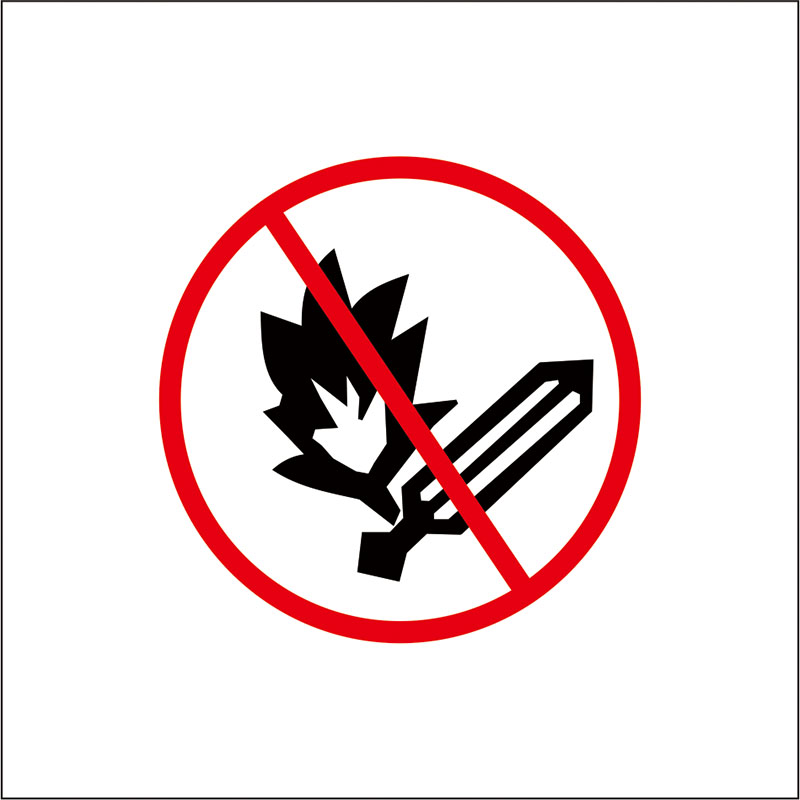The MERITSUN production process prioritizes product safety and ensures the highest product quality.
While cylindrical Lithium-Ion Batteries may appear similar to other types of batteries, the higher energy density in combination with flammable organic electrolyte, rather than traditional aqueous electrolyte, may pose an increased risk of harm if not handled properly as compared to other battery chemistries.
MERITSUN is not liable for death, serious injury, or property damage related to the charging, use and handling of Lithium-Ion Batteries inconsistent with the safety procedures and practices below.
| WARNING | Lithium-Ion Batteries store large amounts of energy. If not used and handled properly, Lithium-Ion Batteries may cause fire or explosion and result in SERIOUS INJURY or DEATH. |
 | To Prevent Fire: ● NEVER use a Lithium-Ion Battery or Battery Pack with visible damage or if you suspect internal damage may have occurred. DO NOT use again and dispose of batteries. See “Proper Disposal” section. ● DO NOT carry individual, cylindrical Lithium Ion Battery in your pockets, your purse, or on your person. AVOID contact with metal objects, including coins, keys or jewelry. ● DO NOT leave Lithium-Ion Batteries in your vehicle or in direct sunlight. Temperatures over 60 ℃(140 ℉) may damage your Lithium Ion Batteries. ● DO NOT attempt to heat Lithium-Ion Batteries or a portion of Lithium-Ion Batteries. - NEVER place Lithium-Ion Batteries near a cooking surface, iron or radiator. - NEVER solder on or near Lithium-Ion Batteries and Battery Packs. - NEVER place in microwave oven, dryer, conventional oven, or high-pressure container. ● AVOID water. Replace batteries if they get wet. Lithium-Ion Batteries may operate normally after getting wet, but the internal circuitry may slowly corrode and result in thermal runaway. ● KEEP Lithium-Ion Battery Packs away from static electricity. Static electricity discharge may damage internal safeguards inside battery packs. ● NEVER crush, puncture, or hit Lithium-Ion Batteries with another object, like a rock or a hammer. ● DO NOT step on or press hard on Lithium-Ion Batteries. The batteries may internally short-circuit and result in a thermal runaway. While individual, cylindrical Lithium-Ion Batteries may look like alkaline batteries, Lithium-Ion Batteries are more sensitive to stress, especially if dropped on a hard surface. |
1. FIRST AID – If battery fluid gets on your skin or in your eyes, wash immediately with water and seek medical attention.
Battery fluid may cause irritation or burns.
2. ONLY use Lithium-Ion Battery Packs if you are a consumer or end-user.
Battery packs should have safeguards to prevent thermal runaway.
3. DO NOT handle individual, cylindrical Lithium-Ion Batteries if you are a consumer or end-user.
Individual Lithium-Ion Batteries cannot offer the same level of protection as Lithium-Ion Battery Packs.
4. NEVER short circuit Lithium-Ion Batteries, Battery Packs or battery holders.
Forcing Lithium-Ion Batteries to discharge may result in leaks, fire or explosion.
5. WIPE terminals with dry cloth before use, if dirty.
6. For air travel, leave battery packs installed.
Removing battery packs from devices does not enhance safety.
Pack spare batteries in carry-on baggage. Flight crew members may be able to better monitor conditions in the passenger compartment to prevent an incident, and, if an incident did occur, may be able to access fire extinguishers quickly.
 | ALWAYS store Lithium-Ion Batteries: ● Away from children and pets. ● In a dry location at room temperature and in the original packaging until ready for use. DO NOT store in refrigerator or freezer. ● Partially charged. Lithium-Ion Batteries with either no charge remaining or fully charged may be unstable and could lead to thermal runaway and result in fire. |
1. DO NOT remove individual Lithium-Ion Batteries or Battery Packs from the original packaging until required for use.
2. ALWAYS remove Lithium-Ion Batteries or Battery Pack if the device will not be used for several months, if possible.
Batteries may leak if left in the device for extended periods of time.
After extended periods of storage, always check the voltage of the batteries or battery pack prior to charging. NEVER use or charge batteries or battery packs if the voltage is less than 2.5 V/cell.
1. ALWAYS dispose of batteries according to local, state or federal laws. DO NOT put Lithium-Ion Batteries in the trash.
Consult your local waste authority for information about recycling or disposal options. You may be able to bring Lithium-Ion Batteries and Battery Packs to local stores for proper disposal.
2. ALWAYS cover terminals with tape to prevent inadvertent contact with other batteries or metal objects.
3. DO NOT mix alkaline or other types of batteries with your used Lithium-Ion Batteries.
4. DO NOT place used batteries in piles, drawers, bags, boxes or other containers together.
Used batteries may still have a partial charge remaining. If the partially charged batteries come in contact, the remaining stored energy could discharge and cause a fire.
5. NEVER dispose of batteries in a fire.
Fire may cause the batteries to explode result in chemical burns and serious injury.

